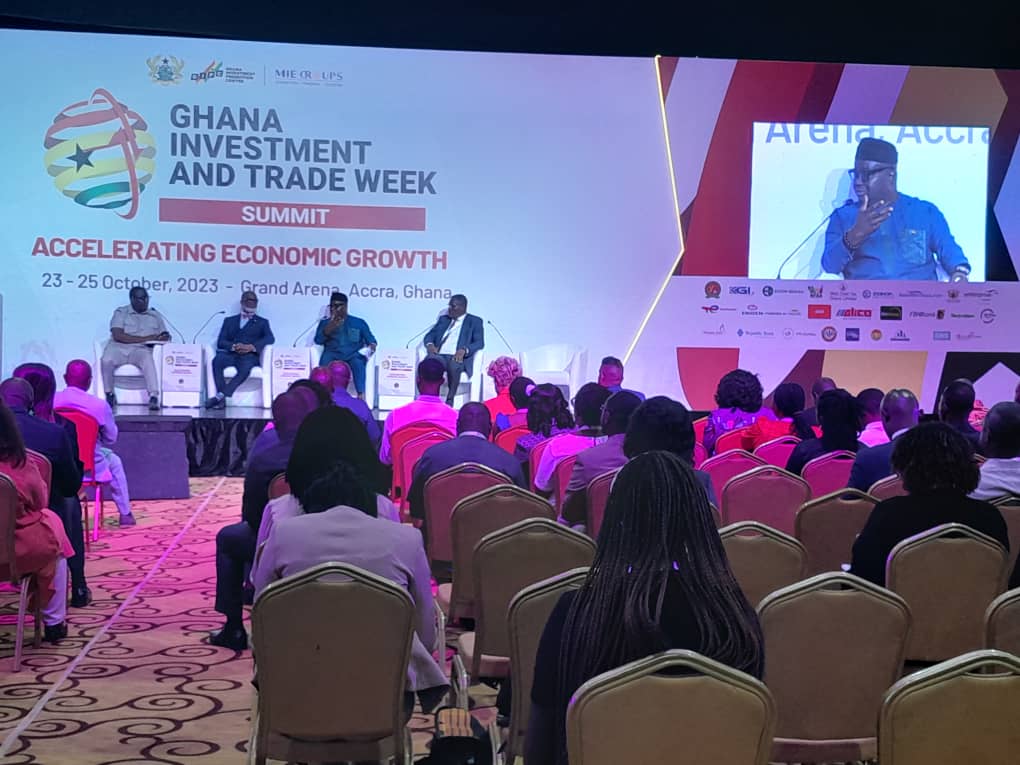By Francis Ntow/Sherrie Attitsogbi
Accra, Oct. 25, GNA – Manufacturers, businesses, traders, and investors aim to unlock infrastructural bottlenecks to actualise the full benefits of the African Continental Free Trade Area (AfCFTA).
This is happening at a three-day Ghana Investment Trade Week, which opened on Monday, October 23, 2023, in Accra.
The summit is being organised by the Ghana Investment Promotion Centre (GIPC) in collaboration with MIE Group, Dubai, and the Ghana Chamber of Construction.
The State Interests and Governance Authority (SIGA) and KGL Group are supporting the summit.
The summit seeks to find lasting solutions to roads, railways, airlines, Information and Communication Technology (ICT), and energy infrastructural challenges that would make trade on the continent easier and faster.
It is to also create a platform to promote investment, trade and knowledge exchange in Ghana and Africa.
In an interview with the Ghana News Agency after a ceremonial opening, Mr Mike Ocquaye-Jnr, Chief Executive Officer (CEO) of Ghana Free Zones Authority (GFZA), said it was critical to overcome those infrastructural difficulties.
“If you, for example, want to travel from Ghana to Congo, you may have to fly to Brussels, and then from Brussels, you fly in, which shouldn’t be the case,” he said.
“We want to ensure that we connect Rwanda and Tanzania and all other countries, that’s why we’re finding a holistic solution to these infrastructural problems,” Mr Ocquaye-Jnr said.
He noted that Ghana, for example, had developed undersea cables, which were not common in other countries in Africa, but ultimately aimed at improving connectivity across the continent.
Mr Yofi Grant, CEO, of GIPC, said AfCFTA would recreate the African economy, and transform many sectors, but requires continent-wide policies and efforts to solve the various infrastructural challenges.
With our young people and mineral resources, we can develop the capacity and produce to trade within ourselves to increase intra-continental trade by 30 per cent by adding value for export.
He explained that Ghana holding the summit demonstrated its ability to facilitate trade in Africa with a focus on Sustainable Development Goal (SDG1) – poverty alleviation and SDG17 – partnership for trade and development.
“AfCFTA started as an initiative between countries, but now it needs to percolate down to the private sector; it’s the private sector that’s going to invest its capital and create the products that we can trade amongst ourselves,” he said.

He referred to Africa’s rich resources, including having 90 per cent of the world’s platinum and cobalt, and a significant proportion of the world’s quota not to mention lithium, copper, and titanium salts.
“We need as governments to then facilitate our private sector to participate in these larger economies because that’s the way we’re going to create wealth by supporting the private sector to create jobs and other opportunities for our young people,” Mr Grant said.
Mr Zahoor Ahmed, Vice President of Strategy and Partnerships, at MIE Group, said the summit would also capture global market attention, including Asia, the Middle East and Europe.
By so doing, the summit would create a congenial atmosphere to explore opportunities for partnerships, and trade and bring in more Foreign Direct Investment into Africa.
GNA